The NDP takes the lead in Alberta
May 13, 2023
With just over two weeks to go in the Alberta provincial election, a new survey of 885 eligible voters in Alberta by Abacus Data finds the Alberta NDP jumping ahead of the UCP after several months of near or complete deadlock in vote intentions between the two parties.
In this report, I’ll share results from this survey with a focus on vote intention, leader impressions, and perceptions about the election itself.
The NDP leads the UCP
Among all eligible voters, the NDP has gained 7 points from our last survey before the election started. 43% of eligible voters say they would vote NDP followed by the UCP at 35%, the Alberta Party at 4% and other parties get 3%. 14% say they are still undecided – down eight points since April.
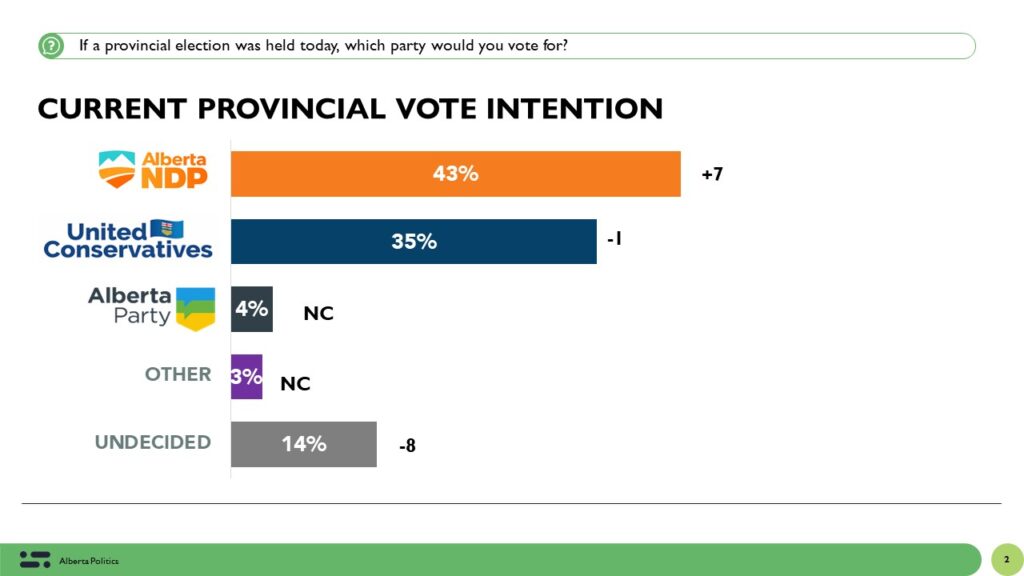
This is the first time in our tracking that the NDP support is above 40% and is the largest lead we’ve measured for either party in the five waves of research we completed.
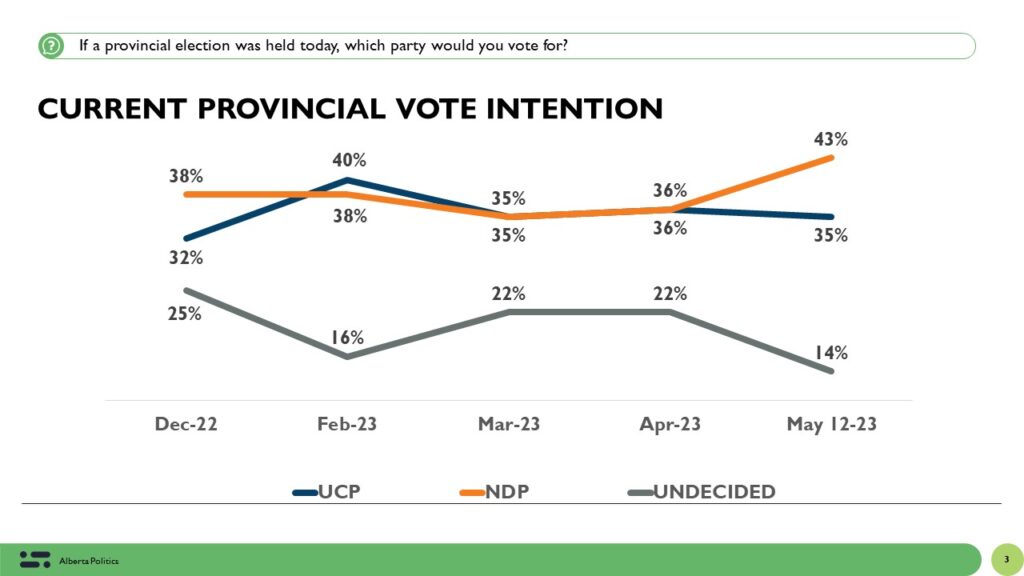
Among eligible voters likely to vote, the NDP lead is slightly smaller (5 points) with the NDP at 46%, the UCP at 41%, and undecided at 9%.
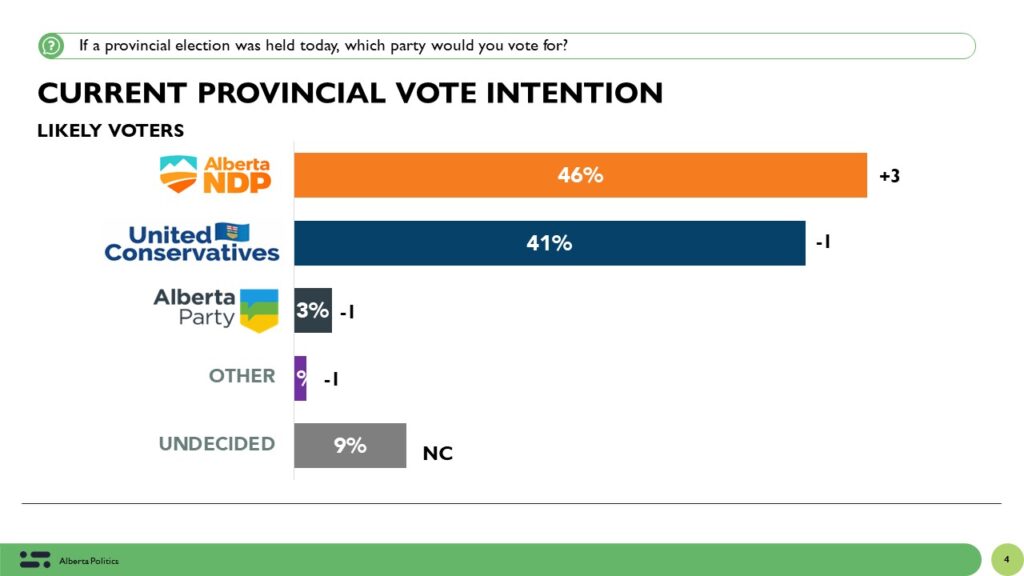
When we remove the undecided, the ballot among all decided voters is 51% for the NDP and 41% for the UCP – a 5-point gain for the NDP and a 5-point loss for the UCP since the start of the campaign.
Among decided likely voters, the ballot is closer with the NDP ahead by 6, 51% to 45%.
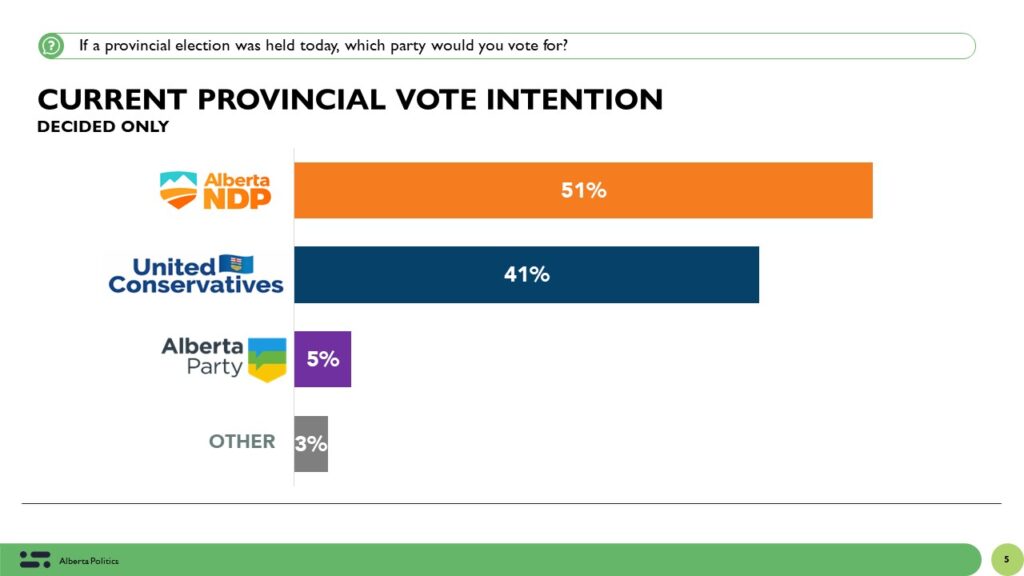
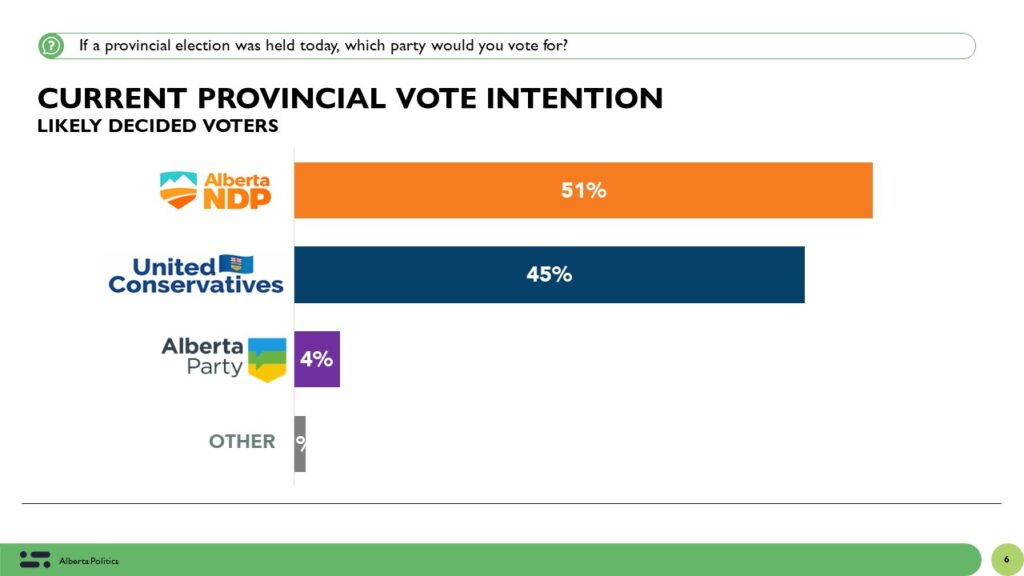
NDP gains among Reluctant UCPers.
In previous reports, we have profiled a group within the electorate who say they voted UCP in 2019 but today are either undecided or voting for another party. I call them “Reluctant UCPers”.
They still represent about 16% to 18% of the electorate but we have seen a noticeable shift in their vote intentions. Back in April, 51% of this group was undecided while 34% said they were going to vote NDP. Today, undecideds are down 17 points while half now say they are voting NDP. This helps explain the big rise in NDP support as those who are undecided have dropped.
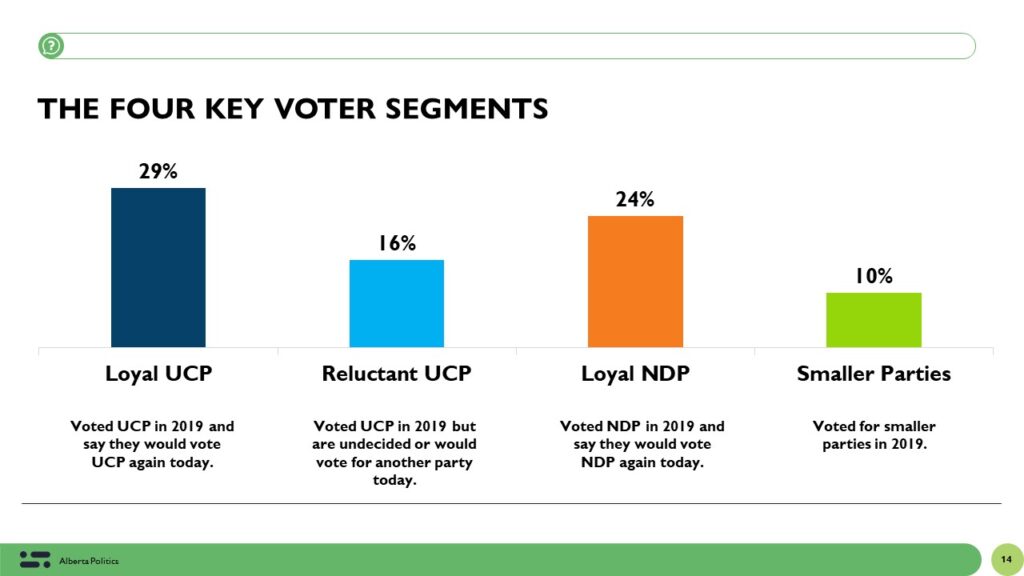
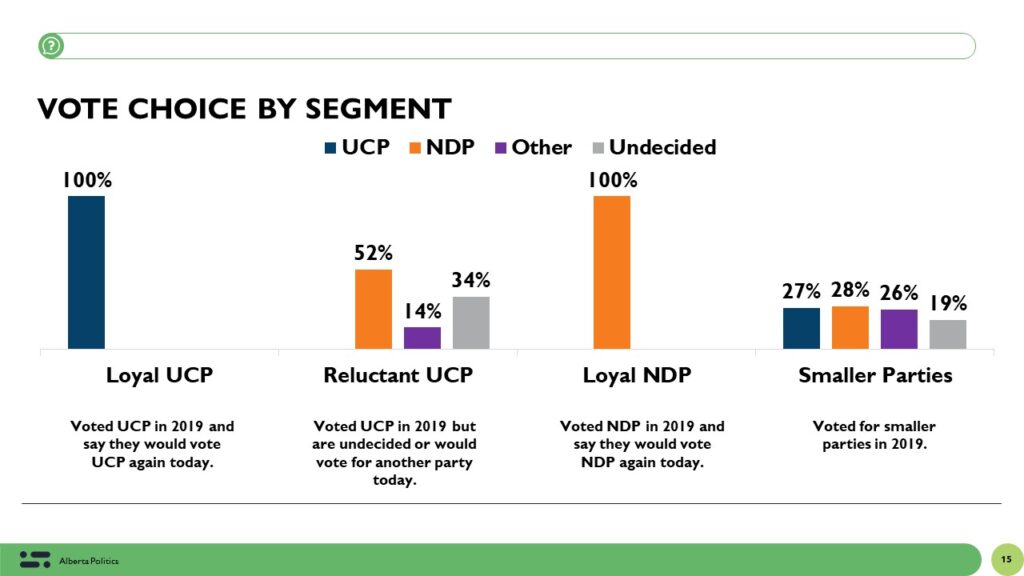
The NDP is ahead in Calgary
Regionally, the NDP is ahead by over 30 in Edmonton, the UCP leads by 8 outside of the two largest cities, while the NDP is slightly ahead in Calgary (42% to 36%). Note, we ask respondents to self-report where they live so it’s likely these results represent Calgary and Edmonton proper and not the CMAs. It also means suburban and nearby communities around Calgary and Edmonton are included in the “other areas” region.
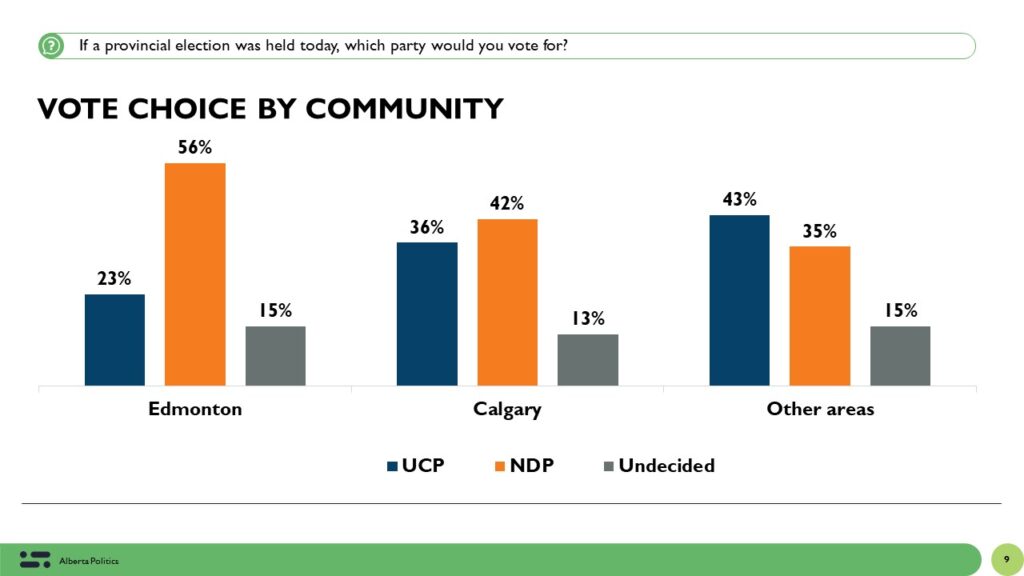
When undecideds are removed, the results in those regions are:
Calgary: NDP 49%, UCP 41%, AP 5%
Edmonton: NDP 66%, UCP 27%, AP 5%
Other communities: UCP 51%, NDP 41%, AP 4%
These estimates change slightly when we isolate only those likely to vote:
Calgary: NDP 50%, UCP 46%
Edmonton: NDP 65%, UCP 28%
Other communities: UCP 57%, NDP 39%
NDP is well ahead among under 45 and women.
The NDP has made gains across demographic groups but now has a 16-point lead among those under 45, is tied with the UCP among those over 45, leads by 12 among women, and is slightly ahead among men.
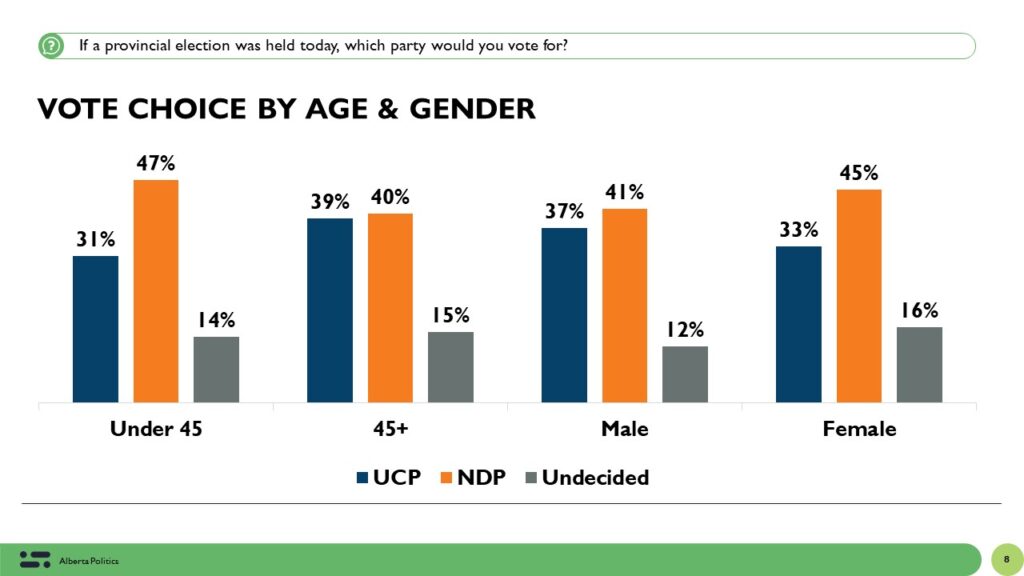
The NDP is competitive with the UCP among those with high school or less and college while ahead by almost 30 points among those with a university degree.
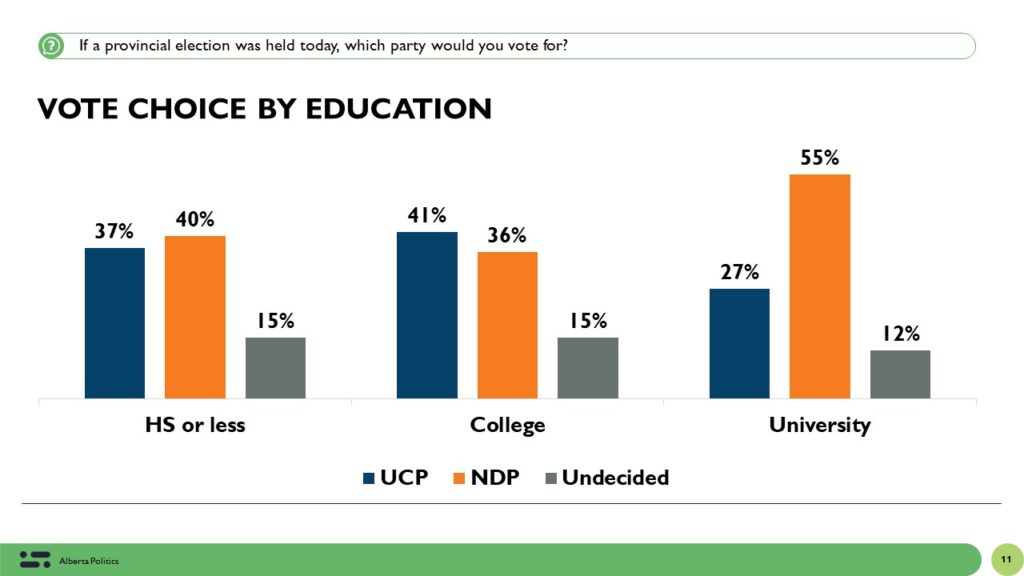
NDP has a big, 43-point lead among those who self-identify as a member of a racialized community. 65% would vote NDP, 22% UCP, and 10% are undecided. Among those who don’t self-identify as a member of a racialized group, the UCP leads by 3 (39% to 36%) with 16% undecided.
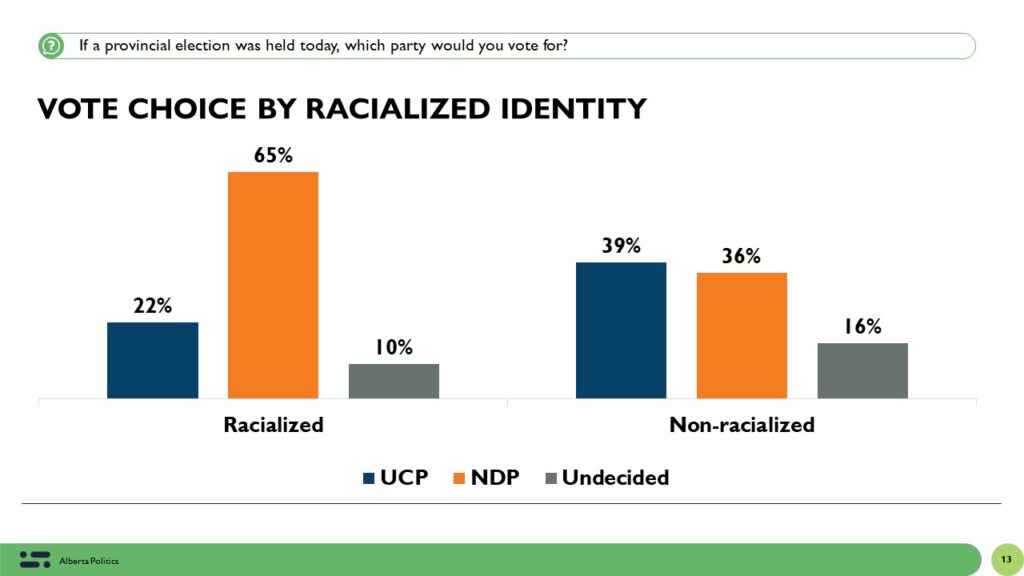
Past UCP voters remain the most undecided at this point.
We continue to track how past UCP voters say they are going to vote. Today, 65% of those who say they voted UCP in 2019 will vote for the party again. This is up by 5 since April. 18% say they are voting NDP, up 5 as well. Note, about 1 in5 of those who voted UCP in 2019 say they are voting NDP this time while 12% remain undecided.
Among past NDP supporters, 87% will vote NDP again, 5% are backing the UCP, and 6% are undecided.
Among those who didn’t vote in 2019 – 42% say they will vote NDP, 16% UCP and 29% are undecided.
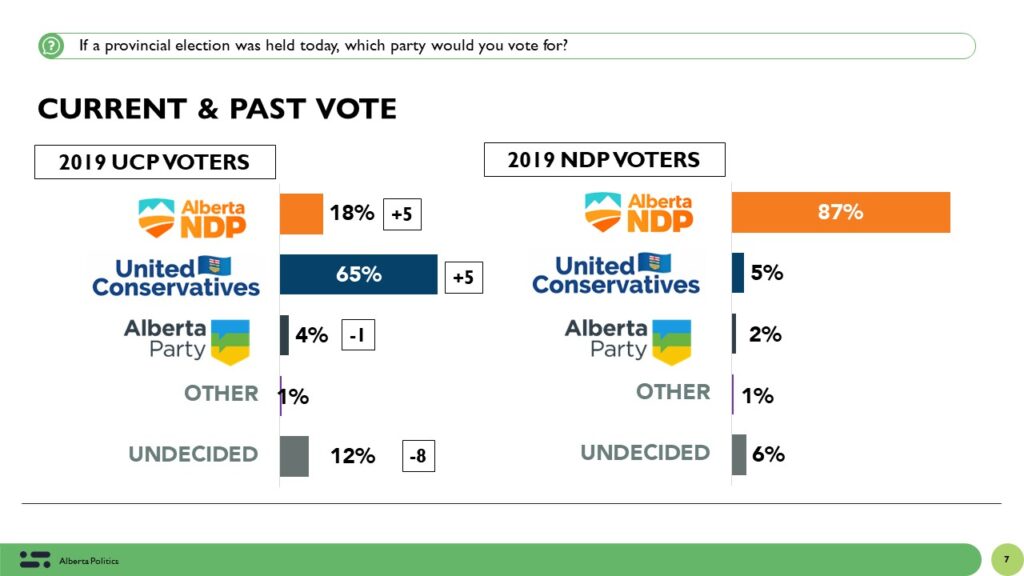
When we look at the relationship between past federal vote and current provincial vote intentions, we find that past federal Liberal and NDP voters overwhelmingly support the Alberta NDP. Among past federal Conservative supporters, 61% are voting UCP, 19% NDP, and 16% are undecided.
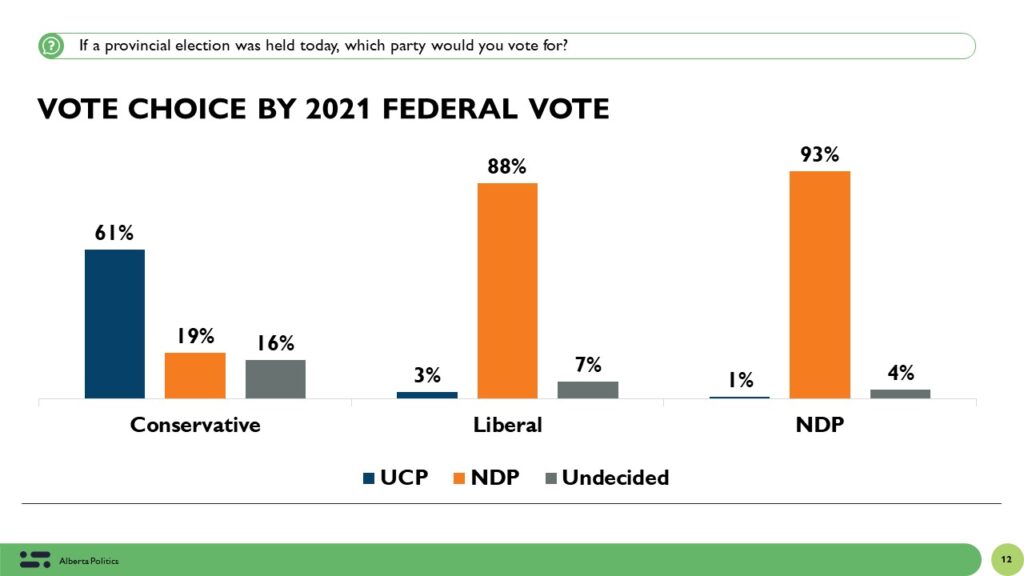
One thing to note, both loyal UCPers and loyal NDPers are highly engaged and likely to vote. Reluctant UCPers and those who voted for smaller parties in 2019 are somewhat less likely to vote.
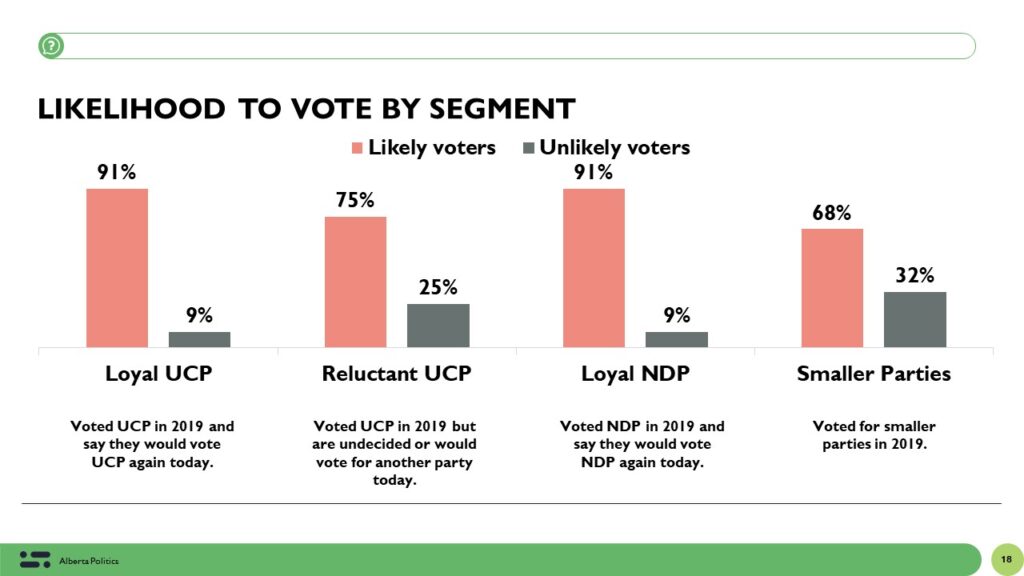
How do they feel about the leaders?
Those with a negative impression of UCP leader Danielle Smith have increased over the past few weeks. Today 31% have a positive impression of her while 49% have a negative impression for a net score of -18. Negative impressions of Smith are up 6 points since the start of the campaign.
For NDP leader Rachel Notley, 39% have a positive impression while 40% have a negative impression for a net score of -1. Views of Rachel Notley are largely unchanged.
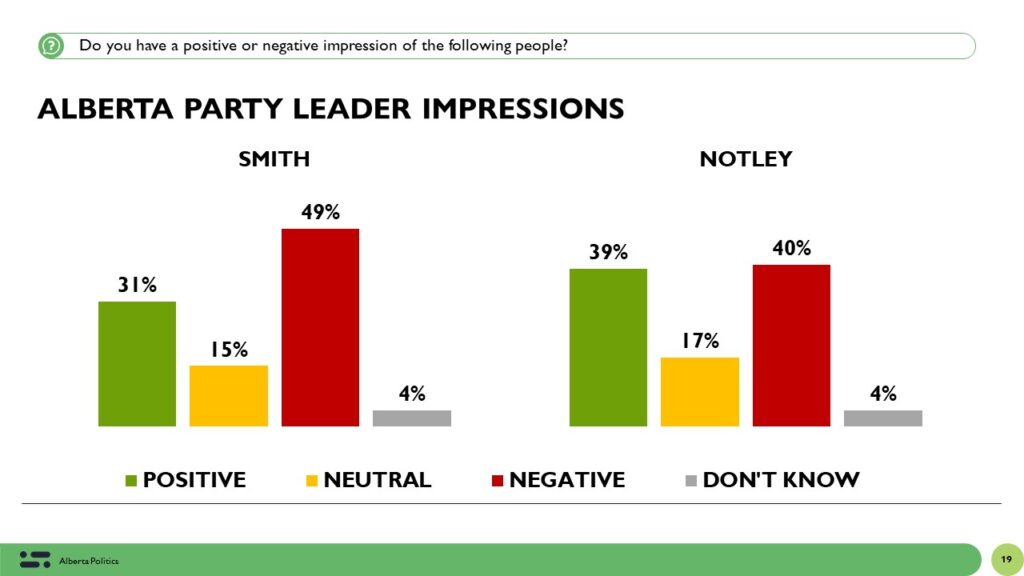
Also worth noting, negative impressions of Danielle Smith are also more intense. 36% of eligible voters have a very negative impression of Smith compared with 31% who feel the same way about Rachel Notley. It’s clear both leaders are quite polarizing.
When we look at how party supporters feel about both leaders, that polarization becomes even more apparent. 80% of UCP supporters like Smith while only 2% like Notley. In contrast, 82% of NDP supporters like Notley but only 3% like Smith. The relationship between one’s vote choice and impression of the party leader is almost perfectly correlated demonstrating just how important leader image is to the vote in Alberta right now.
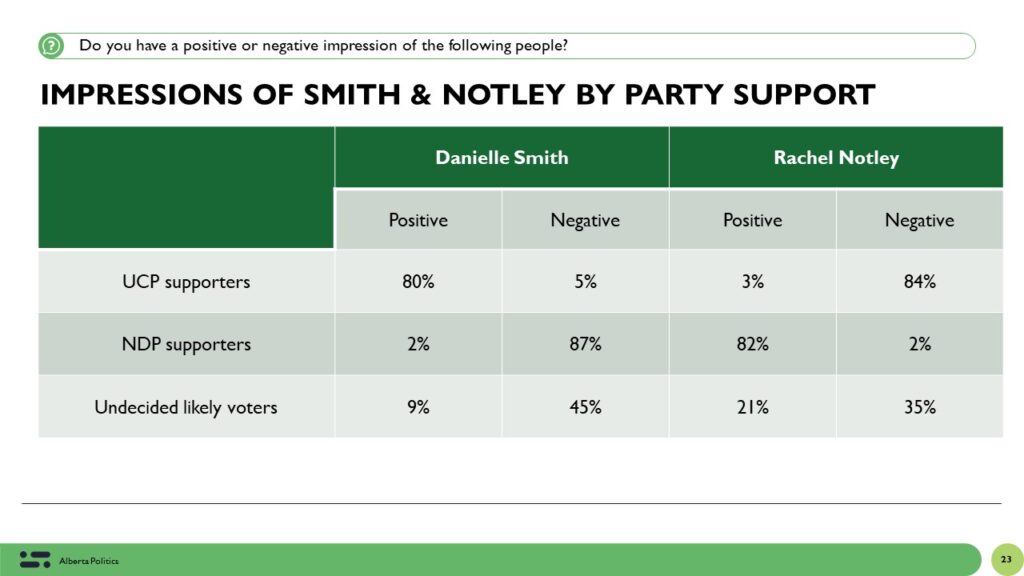
The survey also finds that more Albertans say their impression of Danielle Smith has gotten worse than those who say that of Rachel Notley. 40% say their impression of Danielle Smith has gotten worse while 25% say the same thing about Rachel Notley. At this point in the campaign, neither leader has much positive momentum, but it’s clear Smith has more negative momentum than Notley.
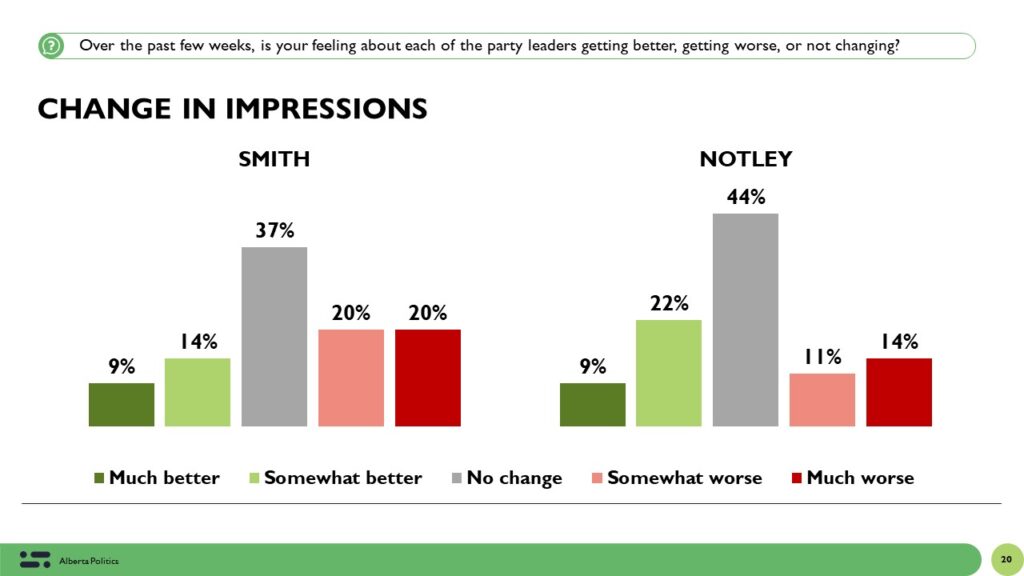
A few other insights
Despite the NDP leading, more think Danielle Smith will be premier after the election than Rachel Notley, although over 1 in 3 eligible voters think it’s really too close to say.
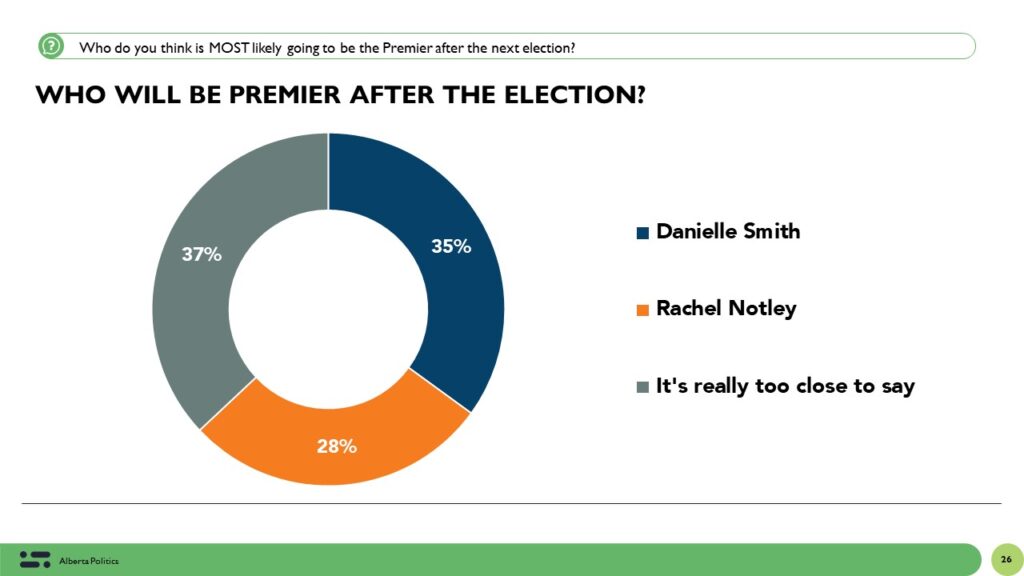
And the perception of a close race has increased since before the campaign. Today, 63% think the election is going to be close while 15% think the UCP will win easily and 8% think the NDP will win easily. When voters think it’s going to be close – turnout is likely to be higher.
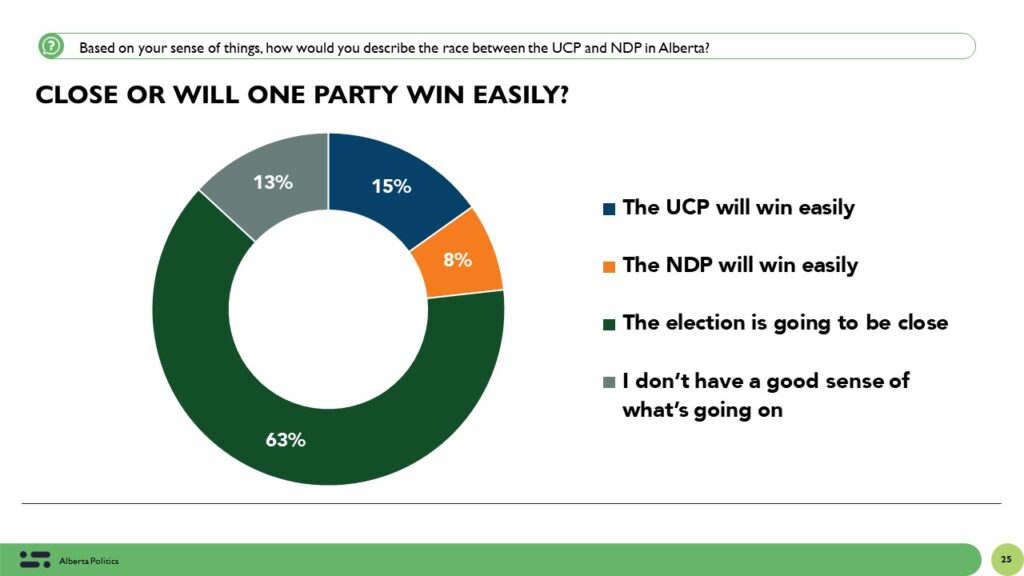
THE UPSHOT
As things stand right now, the Alberta NDP has won the first few weeks of the campaign – or, the UCP and Danielle Smith have lost it. A sizeable portion of previously undecided voters are now backing the NDP which has taken a clear lead province-wide. Edmonton is solidly orange while Calgary seems to be more favourable to the NDP than it was in our last survey.
Campaign events has pushed a large portion of Reluctant UCPers towards the NDP, despite their natural inclination to vote for Conservative parties. What’s driving this behaviour? At this point, it’s all about Danielle Smith.
Among Reluctant UCPers, 69% have a negative impression of Danielle Smith. Only 9% have a positive view. Remember, these are people who voted for Jason Kenney and the UCP in 2019. 82% of them voted for Erin O’Toole and the federal Conservatives in 2021. They would normally vote for a Conservative party. Today, they say they would vote NDP.
And while they don’t love Rachel Notley – the group has more positive than negative views of her (38% positive vs. 31% negative). Most can accept her as premier if it means Danielle Smith is denied re-election.
Since the first time I identified these Reluctant UCPers, I’ve said they will decide the election. And if an election was held today, their shift towards the NDP puts Notley in a good position to win the province again.
Albertans believe this election is close. More still think Smith is going to win, but there is a lot of uncertainty. The electorate is pretty divided in their views of the leaders which means we could see a fairly high turnout.
Now, there are still two weeks to go and a lot of time for these views to change. But my initial perspective that this election was the UCP’s to lose seems to be coming true. They are losing it. Unless they can make Smith more appealing or generate more fear about an NDP win, Danielle Smith may be feeling a bit of Deja Vu about another defeat snatched from the jaws of victory.
METHODOLOGY
The survey was conducted with 885 Alberta adults eligible to vote from May 9 to 12, 2023.
A random sample of panelists were invited to complete the survey from a set of partner panels based on the Lucid exchange platform. These partners are typically double opt-in survey panels, blended to manage out potential skews in the data from a single source.
The margin of error for a comparable probability-based random sample of the same size is +/- 3.4%, 19 times out of 20.
The data were weighted according to census data to ensure that the sample matched Alberta’s population according to age, gender, educational attainment, and region. Totals may not add up to 100 due to rounding.
This survey was paid for by Abacus Data Inc.
Abacus Data follows the CRIC Public Opinion Research Standards and Disclosure Requirements that can be found here: https://canadianresearchinsightscouncil.ca/standards/
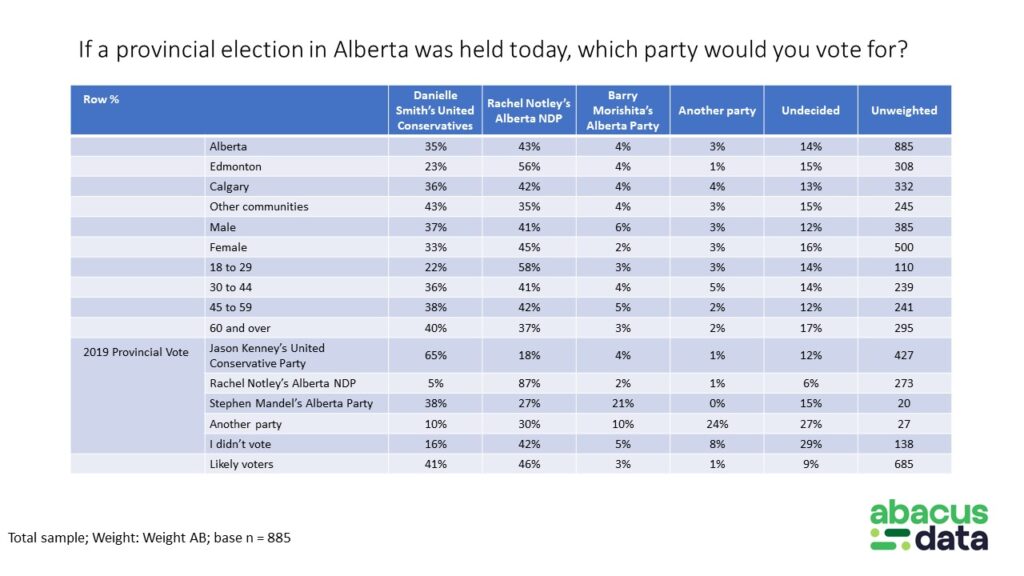
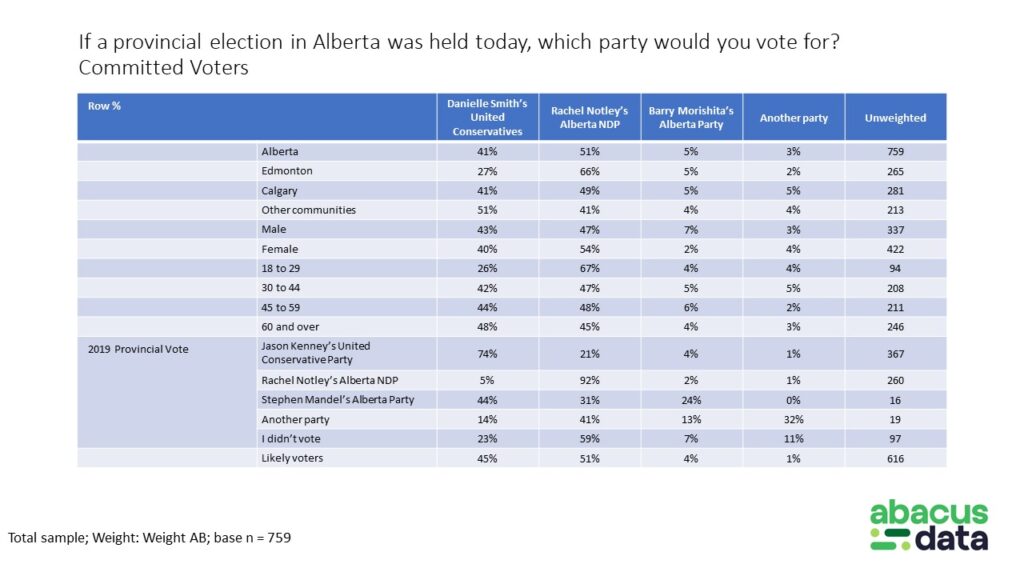
ABOUT DAVID COLETTO
David Coletto is Chair, CEO and a founding partner of Abacus Data a full-service market research and strategy firm based in Ottawa and Toronto. With over a decade and a half of experience in the industry, David and his partners founded Abacus 12 years ago and since then David has become one of Canada’s most respected social researchers regularly commenting on politics, the labour market, and consumer behaviour.
He earned a PhD in Political Science from the University of Calgary in 2010 and is an adjunct professor at Carleton University. He is the host and producer of inFocus with David Coletto a podcast that explores the intersection of public opinion, politics, public policy, and consumer behaviour.
ABOUT ABACUS DATA
We are the only research and strategy firm that helps organizations respond to the disruptive risks and opportunities in a world where demographics and technology are changing more quickly than ever.
We are an innovative, fast-growing public opinion and marketing research consultancy. We use the latest technology, sound science, and deep experience to generate top-flight research-based advice to our clients. We offer global research capacity with a strong focus on customer service, attention to detail, and exceptional value.
We were one of the most accurate pollsters conducting research during the 2021 Canadian election following up on our outstanding record in 2019.
Contact us with any questions.
Find out more about how we can help your organization by downloading our corporate profile and service offering.



